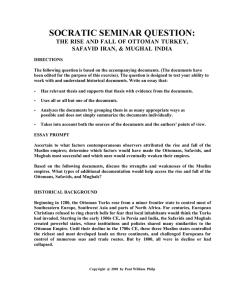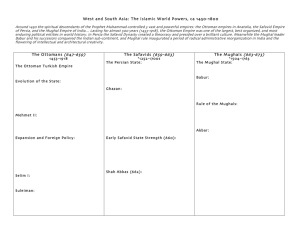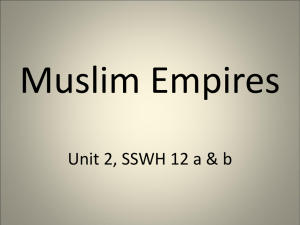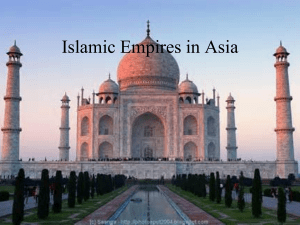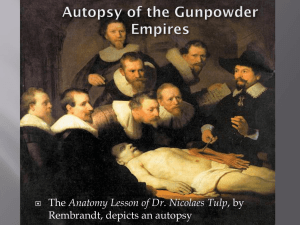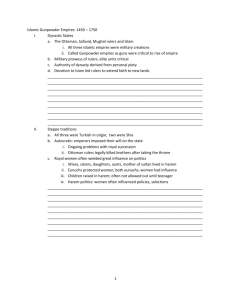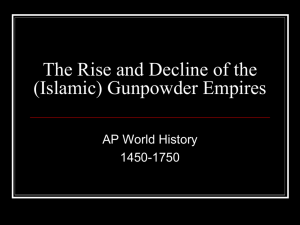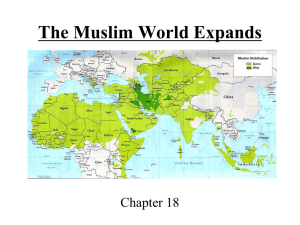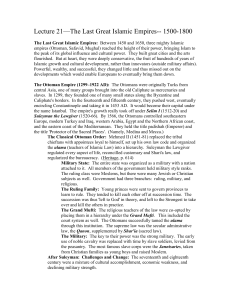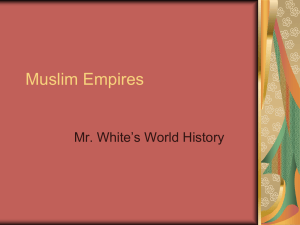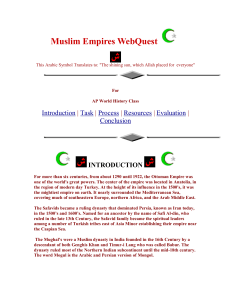DOCUMENT BASED QUESTION: PRE
advertisement
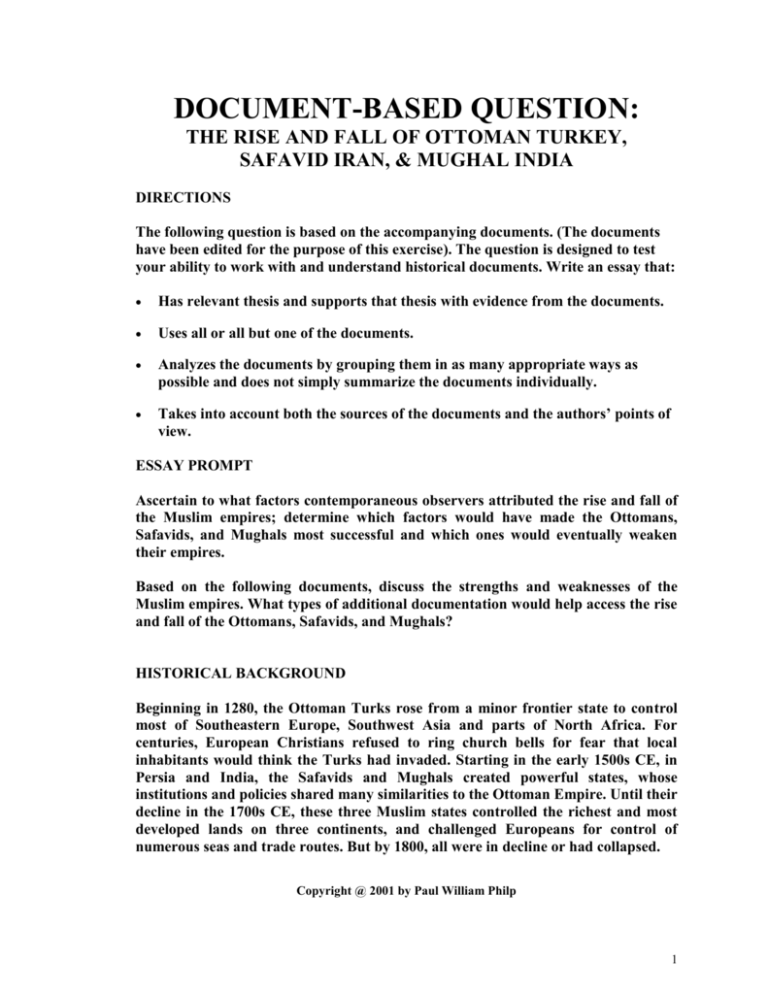
DOCUMENT-BASED QUESTION: THE RISE AND FALL OF OTTOMAN TURKEY, SAFAVID IRAN, & MUGHAL INDIA DIRECTIONS The following question is based on the accompanying documents. (The documents have been edited for the purpose of this exercise). The question is designed to test your ability to work with and understand historical documents. Write an essay that: Has relevant thesis and supports that thesis with evidence from the documents. Uses all or all but one of the documents. Analyzes the documents by grouping them in as many appropriate ways as possible and does not simply summarize the documents individually. Takes into account both the sources of the documents and the authors’ points of view. ESSAY PROMPT Ascertain to what factors contemporaneous observers attributed the rise and fall of the Muslim empires; determine which factors would have made the Ottomans, Safavids, and Mughals most successful and which ones would eventually weaken their empires. Based on the following documents, discuss the strengths and weaknesses of the Muslim empires. What types of additional documentation would help access the rise and fall of the Ottomans, Safavids, and Mughals? HISTORICAL BACKGROUND Beginning in 1280, the Ottoman Turks rose from a minor frontier state to control most of Southeastern Europe, Southwest Asia and parts of North Africa. For centuries, European Christians refused to ring church bells for fear that local inhabitants would think the Turks had invaded. Starting in the early 1500s CE, in Persia and India, the Safavids and Mughals created powerful states, whose institutions and policies shared many similarities to the Ottoman Empire. Until their decline in the 1700s CE, these three Muslim states controlled the richest and most developed lands on three continents, and challenged Europeans for control of numerous seas and trade routes. But by 1800, all were in decline or had collapsed. Copyright @ 2001 by Paul William Philp 1 Document 1 Father Paul Simon, missionary to the Safavid court of Shah Abbas the Great in the city of Isfahan, his report to Pope Clement VIII, 1605 “He is very valiant and has a great liking for warfare and weapons of war, which he has constantly in his hands: we have been eye-witnesses of this because, whenever we were with him, he was adjusting his [swords], testing his [muskets], etc: . . . This is the great experience, which he has obtained of warfare over so many years, that he makes it in person and from the first has made him a fine soldier and very skilled, and his men so dexterous that they are little behind our men in Europe. He has introduced into his militia the use of and esteem for [muskets], in which they are very practiced. Therefore it is that his realm has been so much extended on all sides. . . . All the above mentioned soldiers, who will total some 100,000, receive pay for the whole year. “ Document 2 IMPERIAL MUGHAL REVENUE AND EXPENDITURE, 1595-1596 Income in Dams (Mughal Copper Coins) Effective Revenues Collected Millions 3,960.3 Expenditures for Imperial Nobility Mughal Nobles Animal Allowances Enlisted, heavily armed cavalry and regional troops Sub-total 827.5 371.4 2038.9 3237.8 Expenditures for Central Military Establishment Cavalry and footsoldiers Animals and stables Arsenal and armor; supplies Sub-total 142.9 194.0 22.1 359.0 Expenditures for Imperial Household and Construction Sub-total 187.4 Total Expenditures Revenue surplus 3784.2 176.1 Copyright @ 2001 by Paul William Philp 2 Document 3 Ogier Ghiselin de Busbecq, Hapsburg Ambassador to Suleiman the Magnificent, Constantinople, from letters sent to the Austrian Emperor, 1554 to 1562 “The sultan’s hall was crowded with people, . . . but there was not in all that great assembly a single man who owed his position to anything save valor and merit. No distinction is attached to birth among the Turks. . . . In making his appointments, the Sultan pays no regard to any pretensions on the score of wealth or rank, nor does he take into consideration recommendations or popularity. He considers each case on its own merits, and examines carefully into the character, ability, and disposition of the man whose promotion is in question. . . . Those who receive the highest offices from the Sultan . . . do not believe that high qualities are either natural or hereditary, nor do they think that they can be handed down from father to son, but that they are partly the gift of God, and partly the result of good training [in state schools], great industry, and unwearied zeal. . . Among the Turks, therefore, honors, high posts, and judgeships are the rewards of great ability and good service. If a man be dishonest, or lazy, or careless, he remains at the bottom of the ladder. This is the reason that they are successful in their undertakings . . . and are daily extending the bounds of their empire.” Document 4 Abd ul-Qadir Bada’uni, Orthodox (Sunni) Muslim cleric and opponent of the religious policies (similar to Ottoman and Safavid practices) of the Mughal Emperor Akbar the Great, his writings, 1605 “The emperor came to Fathpur. There he used to spend much time in the Hall of Worship in the company of learned men and sheiks [religious scholars] . . . And samanas [Hindus or Buddhist ascetics] and Brahmans [Hindus] . . . gained the advantage over every one in attaining the honor of interviews with His Majesty, and in associating with him . . . Some time before this a Brahman instructed His Majesty in the secrets and legends of Hinduism . . . Sometimes again it was Sheik Taj ud-din, . . . His Majesty listened the whole night to this Sufi’s [Muslim mystics] obscenities and follies. . . . Learned monks also from Europe, who are called Priests, and have an infallible head called the Pope brought the Gospels and advanced proofs of the Trinity . . . and ordered Prince Murad (the heir) to take a few lessons in Christianity under good auspices, and charged Abu’l Fazl to translate the Gospel. Fire worshipers also came and proclaimed the religion of [Zoroaster]. . . . His Majesty also called some of the yogis, and gave them at night private interviews, inquiring into abstract truths.” Copyright @ 2001 by Paul William Philp 3 Document 5 Dr. François Bernier, French traveler and foreign employee of the Mughal emperor, who also lived for years in Egypt, the Ottoman Empire, and India, from his book about his experiences, 1656 – 1668 “The king [of India], as proprietor of the land, makes over a certain quantity to military men, as an equivalent for their pay. . . . Similar grants are made to governors, in lieu of their salary, and also for the support of their troops, on condition that they pay a certain sum annually to the king out of any surplus revenue that the land may yield. . . . The persons this put in possession of the land, whether as [soldiers], governors, or farmers, have an authority almost absolute over the peasantry, and nearly as much over the artisans and merchants of the towns and villages within their district; and nothing can be imagined more cruel and oppressive than the manner in which it is exercised. . . . The peasant cannot avoid asking himself this question: ‘Why should I toil for a tyrant who may come tomorrow and lay his rapacious hands upon all I possess?’ – The soldiers, governors, and farmers, on their part reason in this manner ‘why should the neglected state of this land create uneasiness in our minds? And why should we expend our money and time to render it fruitful?’” Document 6 William Eton, British consul and merchant who lived many years in the Ottoman Empire, from his book about his life and travels, late 18th century C.E. “General knowledge is little if at all cultivated; every man is supposed to know his own business or profession, with which it is esteemed foolish and improper for any other person to interfere. The man of general science, a character so frequent and so useful in Christian Europe, is unknown; and any one, but a mere artificer, who should concern himself with the founding of cannon, the building of ships, or the like, would be esteemed little better than a madman. . . . With regard to the general ideas entertained by all ranks in Turkey, relative to commerce, they are no less narrow and absurd . . . ‘We should not trade,’ say they, ‘with those beggarly nations, who come to buy of us rich articles of merchandise, and rare commodities, which we ought not to sell them, but we should trade with those who bring to use useful and valuable articles, without the labor of manufacturing, or the trouble of importing them on our part.’ . . . It is therefore no wonder that the foreign commerce of the Turks is comparatively trifling. . . . They have few bills of exchange, or any of the modes of transacting business. The effects which the insecurity of property, and the watchful avarice of the government produce upon commerce, are striking.” Copyright @ 2001 by Paul William Philp 4 Document 7 Sir John Malcolm, British ambassador to the Safavid Court of the Shahs Safi and Abbas II, mid-1600s, commenting in his memoirs about the harem and pleasures, common to later Muslim monarchs in Turkey, Persia, and India “A monarch, who was never permitted to leave this prison [the harem] till he ascended the throne, was likely to be effeminate and inefficient. It was hardly possible that he could resist the intoxication of absolute power. The unlimited indulgences of his passions seemed almost the certain consequence of his former debaucheries, and his entire lack of experience. . . . The love of wine, in which this prince often indulged to excess, was the cause of all the evils of his reign. It was in his moments of intoxication alone that he was capricious, cruel, and unjust; . . . To the public officers of government he was severe, but to the poor mild and lenient.” Document 8 Sari Mehmed Pasha, a Turkish official of the 18th century commenting on the traditional policies of the Sultan towards peasants, merchants, and government “Let them (officials) neither oppress the poor rayahs (peasants) nor cause them to be vexed y the demand for new impositions in addition to the well-known yearly taxes which they are accustomed to give. . . . The poor peasants should not be troubled. The people of the provinces and dwellers in the towns should be protected and preserved by the removal of injustices, and very great attention should be paid to making prosperous the condition of the subjects, making the districts joyous and flourishing and to protecting and preserving the property and lives of travelers on the road. . . . For it has been said that the basis of the ruler’s system is the man of consequence (honest, trained bureaucrat), and the raising of troops requires the paying of ready money by the Treasury, and the prosperity of the country comes through its healthy condition, and the flourishing of the country comes through the granting of justice and the punishment of oppressors.” Copyright @ 2001 by Paul William Philp 5 Footnotes 1. Alfred J. Andrea and James H. Overfield, The Human Record: Sources of Global History, 3rd Edition, Volume II: Since 1500 (Boston: Houghton Mifflin Company, 1998) ,93-94. 2. John F. Richards, The Mughal Empire; The New Cambridge History of India, ed. Gordon Johnson (Cambridge, England: Cambridge University Press, 1993), 76. 3. L. S. Stavrianos, ed., The Epic of Modern Man: A Collection of Readings (Englewood Cliffs, New Jersey: Prentice-Hall, Inc., 1966), 28-29. 4. William Theodore de Bary, ed., Sources of Indian Tradition, Volume I (New York: Columbia University Press, 1958), 432-434. 5. F. Bernier, Travels in the Mogul Empire A.D. 1656 – 1668, trans. A. Constable and V. A. Smith (London: Oxford University, 1916), 224, 225, 227, 252-259. 6. L. S. Stavrianos 42-43. 7. Wilfred Blunt, Isfahan: Pearl of Persia, photographs by Wim Swaan (New York: Stein and Day, Publishers, 1966), 124 and 127. 8. Walter Livingston Wright, Jr., Ottoman Statecraft (Princeton, New Jersey: Princeton University Press, 1935), 116-120. Copyright @ 2001 by Paul William Philp 6
